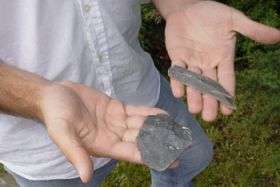New evidence debunks 'stupid' Neanderthal myth

Research by UK and American scientists has struck another blow to the theory that Neanderthals (Homo neanderthalensis) became extinct because they were less intelligent than our ancestors (Homo sapiens). The research team has shown that early stone tool technologies developed by our species, Homo sapiens, were no more efficient than those used by Neanderthals. Published today (26 August) in the Journal of Human Evolution, their discovery debunks a textbook belief held by archaeologists for more than 60 years.
The team from the University of Exeter, Southern Methodist University, Texas State University, and the Think Computer Corporation, spent three years flintknapping (producing stone tools). They recreated stone tools known as 'flakes,' which were wider tools originally used by both Neanderthals and Homo sapiens, and 'blades,' a narrower stone tool later adopted by Homo sapiens. Archaeologists often use the development of stone blades and their assumed efficiency as proof of Homo sapiens' superior intellect. To test this, the team analysed the data to compare the number of tools produced, how much cutting-edge was created, the efficiency in consuming raw material and how long tools lasted.
Blades were first produced by Homo sapiens during their colonization of Europe from Africa approximately 40,000 years ago. This has traditionally been thought to be a dramatic technological advance, helping Homo sapiens out-compete, and eventually eradicate, their Stone Age cousins. Yet when the research team analysed their data there was no statistical difference between the efficiency of the two technologies. In fact, their findings showed that in some respects the flakes favoured by Neanderthals were more efficient than the blades adopted by Homo sapiens.
The Neanderthals, believed to be a different species from Homo sapiens, evolved in Ice Age Europe, while the latter evolved in Africa before spreading out to the rest of the world around 50-40,000 years ago. Neanderthals are thought to have died out around 28,000 years ago, suggesting at least 10,000 years of overlap and possible interaction between the two species in Europe.
Many long-held beliefs suggesting why the Neanderthals went extinct have been debunked in recent years. Research has already shown that Neanderthals were as good at hunting as Homo sapiens and had no clear disadvantage in their ability to communicate. Now, these latest findings add to the growing evidence that Neanderthals were no less intelligent than our ancestors.
Metin Eren, an MA Experimental Archaeology student at the University of Exeter and lead author on the paper comments: "Our research disputes a major pillar holding up the long-held assumption that Homo sapiens were more advanced than Neanderthals. It is time for archaeologists to start searching for other reasons why Neanderthals became extinct while our ancestors survived. Technologically speaking, there is no clear advantage of one tool over the other. When we think of Neanderthals, we need to stop thinking in terms of 'stupid' or 'less advanced' and more in terms of 'different.'"
Now that it is established that there is no technical advantage to blades, why did Homo sapiens adopt this technology during their colonization of Europe? The researchers suggest that the reason for this shift may be more cultural or symbolic. Eren explains: "Colonizing a continent isn't easy. Colonizing a continent during the Ice Age is even harder. So, for early Homo sapiens colonizing Ice Age Europe, a new shared and flashy-looking technology might serve as one form of social glue by which larger social networks were bonded. Thus, during hard times and resource droughts these larger social networks might act like a type of 'life insurance,' ensuring exchange and trade among members on the same 'team.'"
The University of Exeter is the only university in the world to offer a degree course in Experimental Archaeology. This strand of archaeology focuses on understanding how people lived in the past by recreating their activities and replicating their technologies. Eren says: "It was only by spending three years in the lab learning how to physically make these tools that we were able to finally replicate them accurately enough to come up with our findings."
Citation: Are Upper Paleolithic blade cores more productive than Middle Paleolithic discoidal cores? A replication experiment is published by Elsevier, in the Journal of Human Evolution. Authors: Metin I. Eren, Aaron Greenspan, C. Garth Sampson.
Source: University of Exeter





















